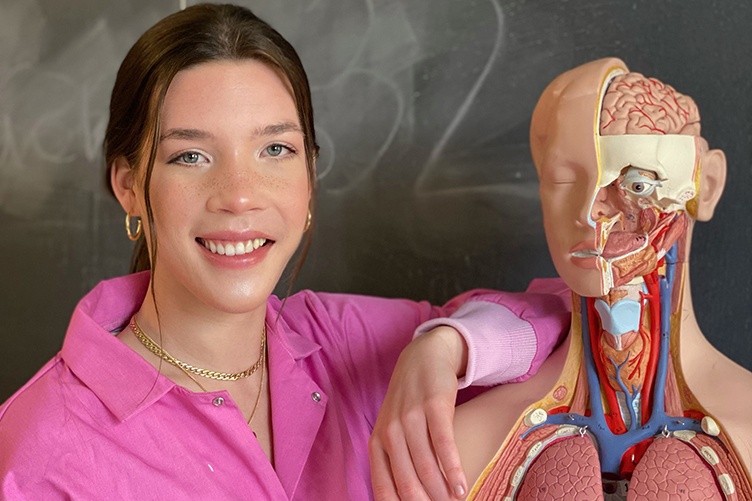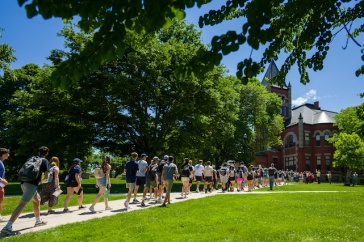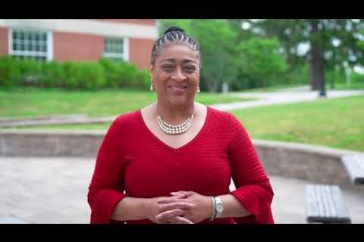
Camryn Berry sports the lab coat she dyed pink. (Courtesy photo)
It was purple hair that first prompted Camryn Berry to feel she’d found a home at UNH as a woman in STEM. It was a pink lab coat that opened the door for thousands to share in her story.
Berry attended Worcester Polytechnic Institute (WPI) as an undergrad and quickly discovered the vibe at the engineering school – overwhelmingly male, some of whom were unapologetically boastful about the demographics – wasn’t a good fit. She enrolled at UNH to pursue her Ph.D. in part because she found precisely the opposite environment, a highly inclusive space supportive of women in STEM.
Even those with unique hairstyles. Berry was already appreciative of the diverse and encouraging atmosphere when she showed up for a seminar introducing students to graduate school taught by Jessica Bolker, who walked in sporting a distinctive look.
“I remember seeing her with her purple hair and thinking, ‘I like this place. I see myself staying here and fitting in,’” Berry quips. “It’s not so much why I came here but why I choose to stay here, and the reason is the people – the people here are just so much more open-minded, they’re so bright and enthusiastic.”

That sense of place has only grown stronger, and Berry highlighted her journey to embracing her femininity in science in a TikTok video as part of a class project in April, dyeing her white lab coat pink “to show my former undergrad self that this is what a scientist can look like,” she says in the post.
Turns out she’d get a lot more than class credit for the video – like a small taste of social media notoriety.
Her first ever TikTok post, Berry uploaded the video one night and thought little of it. A short while later she received a comment praising the post, which had 300 views at the time.
“In the next 10 minutes it was 800 views, then 2,000 views, and I woke up the next morning and it was at 23,000,” Berry says. The video would ultimately receive more than 45,000 views in the first few days and has now been watched nearly 75,000 times.
For frame of reference, Berry grew up in the town of Livermore, Maine – population roughly 2,000.
“I think it’s important for women to see women be proudly feminine in STEM,” Berry, who wears the pink lab coat as a teaching assistant in an anatomy and physiology class, says.
Berry has found no shortage of such women in her time at UNH. As she starts to build toward a career as a professor in academia – she describes teaching as “the thing that sets my soul on fire” – she has been buoyed by the female scientists and instructors she’s encountered in a variety of roles at UNH, including many in positions of influence.
“I think it’s seeing so many leaders who are women,” Berry says. “They’re all so willing and ready to uplift female students. It felt like for the first time in a long time I could voice my opinion and it really mattered what I had to say.”
"I think it's important for women to see women be proudly feminine in STEM."
To some, helping to carry the torch for women embracing femininity in science might feel like a burden, but it’s a responsibility Berry not only welcomes but revels in. Perhaps nothing better represents that approach than the TikTok handle she created to post the video: @thesciencebimbo.
“I feel like a scientist should be anyone who is interested in pursuing science and that’s really the only qualifier,” Berry says. “I chose my handle because if you close your eyes and picture in your head what a bimbo would look like, it’s really just a feminine, conventionally attractive woman. And there’s absolutely nothing wrong with that. Who is to say you can’t be a bimbo in science? It’s just owning your hyper femininity.”
Women aren’t the only underrepresented group Berry is helping to empower in the sciences. She lives with McCune-Albright syndrome, a rare disorder that affects the bones, skin and endocrine system and has caused her to undergo 22 surgical procedures, giving her a unique identity and perspective as not just a woman in STEM but also a disabled student.
It's because of her condition that Berry has wanted to work in science since she was 15 years old. Ever curious, she was eager to learn more about her illness as she endured seemingly endless medical appointments, but none of the doctors or nurses would enlighten her. Until she encountered Dr. Andrea Burke, then a medical student.
“When you’re a kid no one ever speaks to you directly about your illness, they always talk through your parents,” Berry says. “She was the first person who ever spoke to me directly. She asked if I wanted to know the science of the medication I was on and she showed me my own cells and the biological process of the medication, and in that moment, I was like, ‘I have to do this for the rest of my life.’”
In Burke, now an assistant professor at the University of Washington, Berry has a role model who blazed the precise path she hopes to follow. But the responsibility of being that role model for others, be they more women in STEM or disabled students or anyone who wants to break down barriers in the world of science – is not only something Berry is embracing, but something she feels confidently qualified for.
“I think I’m sort of uniquely equipped to leave some doors open for people who come after me in the field,” she says.
-
Written By:
Keith Testa | UNH Marketing | keith.testa@unh.edu



















































